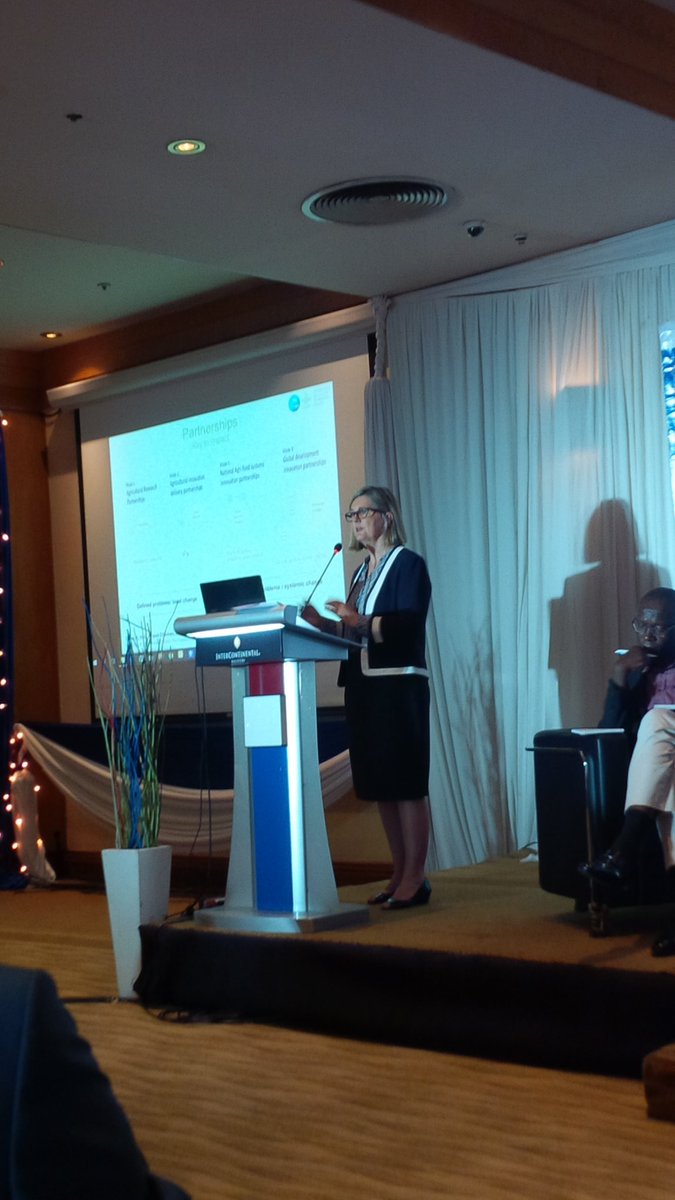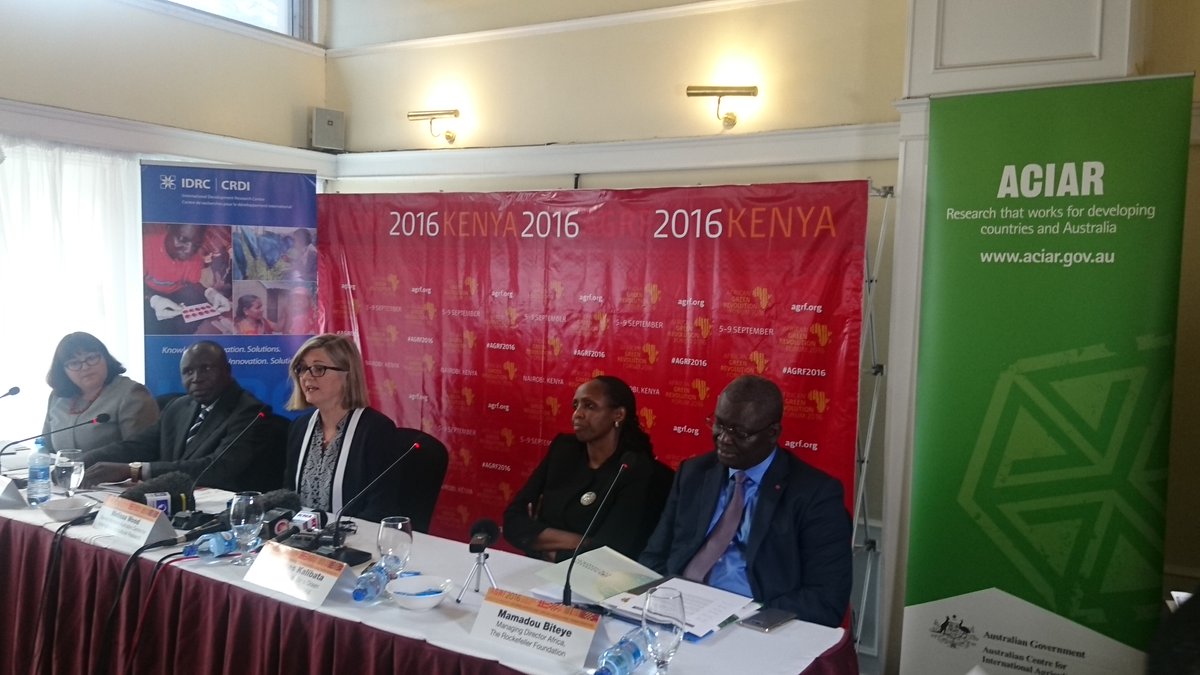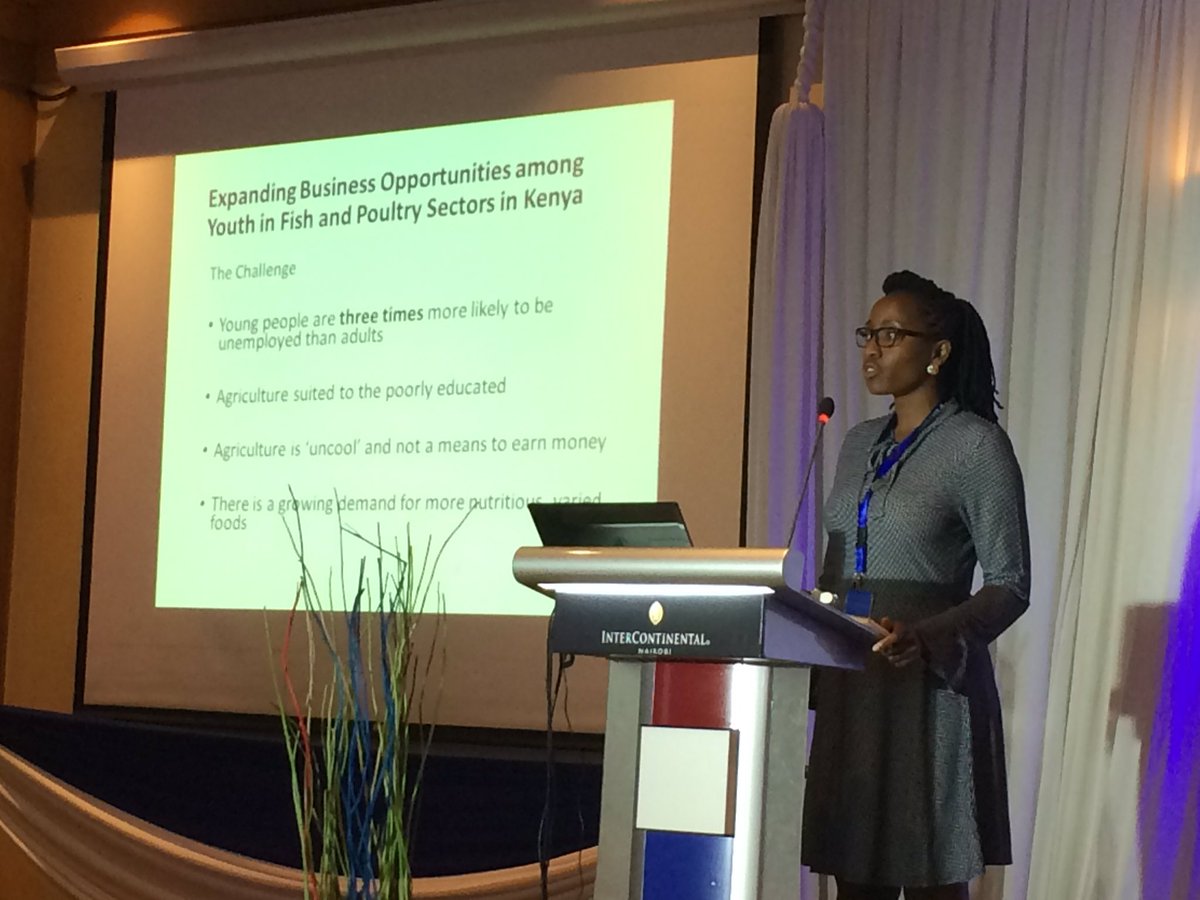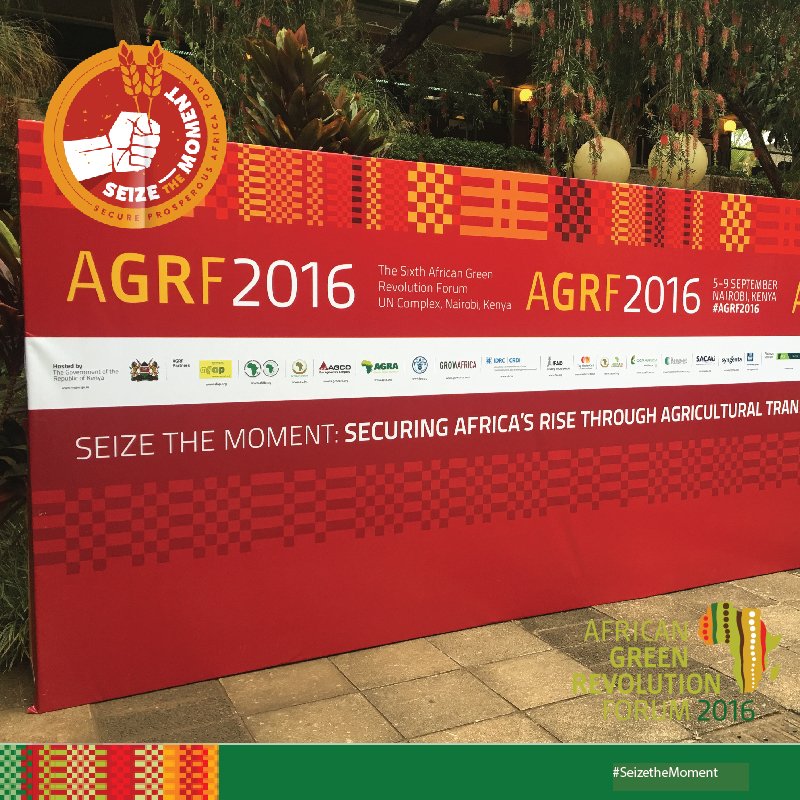5 – 9 September 2016. Nairobi. Some 1,500 delegates are attending the 2016 African Green Revolution Forum (AGRF). The 2016 AGRF brings together heads of state and government, farmer organizations, business leaders and captains of industry, eminent thought leaders, development partners, researchers, and finance and investment leads. Download the Official Program (17 pages)
The delegates will share their insights on how to create, align and leverage financial, technical, policy and market-expanding resources to develop game-changing and
 |
|
Mellissa Wood of
ACIAR Australia on
partnerships for achieving
wide-scale research uptake |
inclusive agribusiness models for Africa. This year’s event will consist of plenary sessions, break-out sessions, B2B meetings, the Africa Food Prize and informal networking opportunities.
The “Seize the Moment” campaign is expected to bring a world-wide call to action from the United States Agency for International Development (USAID), energized by President Obama’s Global Food Security initiative the largest development commitment from the administration and one that is aligned closely with the African Union’s agriculture agenda.
In addition, both the Rockefeller Foundation and the Bill & Melinda Gates Foundation are expected to endorse the campaign and continue their strong backing of efforts to boost production and income for smallholder farmers and local agriculture businesses.
Ten years ago, funding from the two organizations launched the Nairobi-based Alliance for a Green Revolution in Africa (AGRA). Today, they continue to work closely with AGRA, which has developed an extensive network of partners in the public and private sector across 18 countries.
Some of the key speakers include:
Principle strategic AGRF partners include AGRA, the Rockefeller Foundation, Grow Africa, African Development Bank, OCP, AGCO, IFAD, African Fertilizer and Agribusiness Partnership (AFAP), Syngenta, International Development Research Centre (IDRC), YARA, Southern African Confederation of Agricultural Unions (SACAU), the Africa Union and NEPAD Planning and Coordinating Agency.
 5 September. Science And Innovation to Transform African Agriculture — IDRC. IDRC and ACIAR organised a AGRF2016 side event at Nairobi Intercontinental hotel to present the CultiAF projects.
5 September. Science And Innovation to Transform African Agriculture — IDRC. IDRC and ACIAR organised a AGRF2016 side event at Nairobi Intercontinental hotel to present the CultiAF projects.
 |
|
Joab Ouma of Lastinf Solutions,
the processor of the pre cooked Beans
|
KALRO.
 |
|
Acting High Commissioner Jeremy Green
opening remarks at Australia Africa
Plant Biosecurity Partnership
|
Another project is the Australia Africa Plant Biosecurity Partnership. This is a plant biosecurity capacity development program using Australian expertise to strengthen biosecurity skills and planning in Africa. It supports increased production, market access for African farmers and improved food security.
The project, (START DATE: March 16, 2016 ; END DATE: March 16, 2019 ; COUNTRY(S)
Mozambique, Burkina Faso, West Africa ; TOTAL FUNDING: CA$ 2,889,100) led by the Alliance for a Green Revolution in Africa, will field-test delivery models for cowpea and soybean:
Researchers will identify how post-harvest technologies can alleviate women’s workloads and contribute positively to their livelihoods. The project will use business models that ensure long-term economic, environmental, and social sustainability. It will also leverage partnerships between the public and private sectors, farmers’ organizations, and other social entrepreneurs.
By the end of 36 months, the project will reach 7,000 smallholder farmers. It also has the potential to benefit an additional 60,000 farmers by 2020. It will engage 60 youth as service providers and increase incomes through farmer-market linkages. These innovations are expected to reduce post-harvest losses from the current 30% to 10% for the two crops. The research team will share evidence and lessons from the scaling up efforts to improve implementation in the field, and inform policy change and investment.
Another project funded under the CultiAF programme is: Expanding Business Opportunities for
Youth in the Fish and Poultry Sectors in Kenya.
 |
|
Wanjira Gitaiga a young entrepreneur
raising insects for poultry feed
|
This project builds skills and knowledge among young people in Kenya to develop innovative business models that increase their participation in the fisheries and poultry sub-sectors. (START: June 2015, DURATION 18 months)
 |
| Karen Nguru |
Project: Southern Africa: Improving Fish Post-Harvest Management and Marketing in Malawi and Zambia (START October 2014 ; END: April 2017 ; TOTAL FUNDING: CA$ 1,596,900)

Debate: Toward Agricultural Transformation In Africa.
Moderator: Mr. Jeff Koinange, Award Winning Kenyan TV Personality.
Keynote Speaker: Mr. José Graziano Da Silva, Director General, Food And Agriculture Organization (FAO)
Why Or How Does This Report Contribute To Africa’s Agricultural Transformation?
What Drives And Enables Yields And Adoption Of Technologies For Transformation?
How Does Agricultural Transformation Impact – Income, Poverty Reduction, Food Nutrition Security And Resilience?
Why Are Evidence-Based Mechanisms Important For Transformation?
Keynote speakers:
Discussants:
Moderator: Mr. Peter Githinji, Manager, Africa Agribusiness Incubation Network (AAIN)
Setting the Stage: Dr. Alex Ariho, AAIN
Panelists:
Source: PAEPARD FEED
by secretary
by secretary
by secretary
by secretary
by secretary
by secretary
by secretary
by secretary
by secretary
by secretary
by secretary
by secretary
by secretary
by secretary
by secretary
by secretary
by secretary
by secretary
by secretary
by secretary
by secretary
by secretary
by secretary
by secretary
by secretary
by secretary
by secretary
by secretary
by secretary
by secretary
by secretary
by secretary
by secretary
by secretary
by secretary
by secretary
by secretary
by secretary
by secretary
by secretary
by secretary
by secretary
by secretary
by secretary
by secretary
by secretary
by secretary
by secretary
by secretary
by secretary
by secretary
by secretary
by secretary
by secretary
by secretary
by secretary
by secretary
by secretary
by secretary
by secretary
by secretary
by secretary
by secretary
by secretary
by secretary
by secretary
by secretary
by secretary
by secretary
by secretary
by secretary
by secretary
by secretary
by secretary
by secretary
by secretary
by secretary
by secretary
by secretary
by secretary
by secretary
by secretary
by secretary
by secretary
by secretary
by secretary
by secretary
by secretary
by secretary
by secretary
by secretary
by secretary
by secretary
by secretary
by secretary
by secretary
by secretary
by secretary
by secretary
by secretary
by secretary
by secretary
by secretary
by secretary
by secretary
by secretary
by secretary
by secretary
by secretary
by secretary
by secretary
by secretary
by secretary
by secretary
by secretary
by secretary
by secretary
by secretary
by secretary
by secretary
by secretary
by secretary
by secretary
by secretary
by secretary
by secretary
by secretary
by secretary
by secretary
by secretary
by secretary
by secretary
by secretary
by secretary
by secretary
by secretary
by secretary
by secretary
by secretary
by secretary
by secretary
by secretary
by secretary
by secretary
by secretary
by secretary
by secretary
by secretary
by secretary
by secretary
by secretary
by secretary
by secretary
by secretary
by secretary
by secretary
by secretary
by secretary
by secretary
by secretary
by secretary
by secretary
by secretary
by secretary
by secretary
by secretary
by secretary
by secretary
by secretary
by secretary
by secretary
by secretary
by secretary
by secretary
by secretary
by secretary
by secretary
by secretary
by secretary
by secretary
by secretary
by secretary
by secretary
by secretary
by secretary
by secretary
by secretary
by secretary
by secretary
by secretary
by secretary
by secretary
by secretary
by secretary
by secretary
by secretary
by secretary
by secretary
by secretary
by secretary
by secretary
by secretary
by secretary
by secretary
by secretary
by secretary
by secretary
by secretary
by secretary
by secretary
by secretary
by secretary
by secretary
by secretary
by secretary
by secretary
by secretary
by secretary
by secretary
by secretary
by secretary
by secretary
by secretary
by secretary
by secretary
by secretary
by secretary
by secretary
by secretary
by secretary
by secretary
by secretary
by secretary
by secretary
by secretary
by secretary
by secretary
by secretary
by secretary
by secretary
by secretary
by secretary
by secretary
by secretary
by secretary
by secretary
by secretary
by secretary
by secretary
by secretary
by secretary
by secretary
by secretary
by secretary
by secretary
by secretary
by secretary
by secretary
by secretary
by secretary
by secretary
by secretary
by secretary
by secretary
by secretary
by secretary
by secretary
by secretary
by secretary
by secretary
by secretary
by secretary
by secretary
by secretary
by secretary
by secretary
by secretary
by secretary
by secretary
by secretary
by secretary
by secretary
by secretary
by secretary
by secretary
by secretary
by secretary
by secretary
by secretary
by secretary
by secretary
by secretary
by secretary
by secretary
by secretary
by secretary
by secretary
by secretary
by secretary
by secretary
by secretary
by secretary
by secretary
by secretary
by secretary
by secretary
by secretary
by secretary
by secretary
by secretary
by secretary
by secretary
by secretary
by secretary
by secretary
by secretary
by secretary
by secretary
by secretary
by secretary
by secretary
by secretary
by secretary
by secretary
by secretary
by secretary
by secretary
by secretary
by secretary
by secretary
by secretary
by secretary
by secretary
by secretary
by secretary
by secretary
by secretary
by secretary
by secretary
by secretary
by secretary
by secretary
by secretary
by secretary
by secretary
by secretary
by secretary
by secretary
by secretary
by secretary
by secretary
by secretary
by secretary
by secretary
by secretary
by secretary
by secretary
by secretary
by secretary
by secretary
by secretary
by secretary
by secretary
by secretary
by secretary
by secretary
by secretary
by secretary
by secretary
by secretary
by secretary
by secretary
by secretary
by secretary
by secretary
by secretary
by secretary
by secretary
by secretary
by secretary
by secretary
by secretary
by secretary
by secretary
by secretary
by secretary
by secretary
by secretary
by secretary
by secretary
by secretary
by secretary
by secretary
by secretary
by secretary
by secretary
by secretary
by secretary
by secretary
by secretary
by secretary
by secretary
by secretary
by secretary
by secretary
by secretary
by secretary
by secretary
by secretary
by secretary
by secretary
by secretary
by secretary
by secretary
by secretary
by secretary
by secretary
by secretary
by secretary
by secretary
by secretary
by secretary
by secretary
by secretary
by secretary
by secretary
by secretary
by secretary
by secretary
by secretary
by secretary
by secretary
by secretary
by secretary
by secretary
by secretary
by secretary
by secretary
by secretary
by secretary
by secretary
by secretary
by secretary
by secretary
by secretary
by secretary
by secretary
by secretary
by secretary
by secretary
by secretary
by secretary
by secretary
by secretary
by secretary
by secretary
by secretary
by secretary
by secretary
by secretary
by secretary
by secretary
by secretary
by secretary
by secretary
by secretary
by secretary
by secretary
by secretary
by secretary
by secretary
by secretary
by secretary
by secretary
by secretary
by secretary
by secretary
by secretary
by secretary
by secretary
by secretary
by secretary
by secretary
by secretary
by secretary
by secretary
by secretary
by secretary
by secretary
by secretary
by secretary
by secretary
by secretary
by secretary
by secretary
by secretary
by secretary
by secretary
by secretary
by secretary
by secretary
by secretary
by secretary
by secretary
by secretary
by secretary
by secretary
by secretary
by secretary
by secretary
by secretary
by secretary
by secretary
by secretary
by secretary
by secretary
by secretary
by secretary
by secretary
by secretary
by secretary
by secretary
by secretary
by secretary
by secretary
by secretary
by secretary
by secretary
by secretary
by secretary
by secretary
by secretary
by secretary
by secretary
by secretary
by secretary
by secretary
by secretary
by secretary
by secretary
by secretary
by secretary
by secretary
by secretary
by secretary
by secretary
by secretary
by secretary
by secretary
by secretary
by secretary
by secretary
by secretary
by secretary
by secretary
by secretary
by secretary
by secretary
by secretary
by secretary
by secretary
by secretary
by secretary
by secretary
by secretary
by secretary
by secretary
by secretary
by secretary
by secretary
by secretary
by secretary
by secretary
by secretary
by secretary
by secretary
by secretary
by secretary
by secretary
by secretary
by secretary
by secretary
by secretary
by secretary
by secretary
by secretary
by secretary
by secretary
by secretary
by secretary
by secretary
by secretary
by secretary
by secretary
by secretary
by secretary
by secretary
by secretary
by secretary
by secretary
by secretary
by secretary
by secretary
by secretary
by secretary
by secretary
by secretary
by secretary
by secretary
by secretary
by secretary
by secretary
by secretary
by secretary
by secretary
by secretary
by secretary
by secretary
by secretary
by secretary
by secretary
by secretary
by secretary
by secretary
by secretary
by secretary
by secretary
by secretary
by secretary
by secretary
by secretary
by secretary
by secretary
by secretary
by secretary
by secretary
by secretary
by secretary
by secretary
by secretary
by secretary
by secretary
by secretary
by secretary
by secretary
by secretary
by secretary
by secretary
by secretary
by secretary
by secretary
by secretary
by secretary
by secretary
by secretary
by secretary
by secretary
by secretary
by secretary
by secretary
by secretary
by secretary
by secretary
by secretary
by secretary
by secretary
by secretary
by secretary
by secretary
by secretary
by secretary
by secretary
by secretary
by secretary
by secretary
by secretary
by secretary
by secretary
by secretary
by secretary
by admin
by admin
by admin
by admin
by admin
by admin
by admin
by admin
by admin


